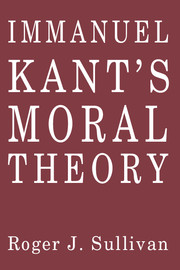Book contents
- Frontmatter
- Contents
- Preface
- Key to abbreviations and translators
- 1 Introduction
- 2 The context for Kant's moral philosophy
- Part I The nature of morality
- 3 The nature of human action
- 4 Prudence: taking care of our own interests
- 5 Morality: living autonomously
- 6 Morally obligatory ends
- 7 The defense of morality
- 8 The primacy of morality
- Part II The moral norm for persons
- Part III The norm for moral judgment
- Part IV Kant on history, politics, and religion
- Appendixes
- Notes
- Bibliography
- Index of names
- Index of subjects
4 - Prudence: taking care of our own interests
Published online by Cambridge University Press: 05 June 2012
- Frontmatter
- Contents
- Preface
- Key to abbreviations and translators
- 1 Introduction
- 2 The context for Kant's moral philosophy
- Part I The nature of morality
- 3 The nature of human action
- 4 Prudence: taking care of our own interests
- 5 Morality: living autonomously
- 6 Morally obligatory ends
- 7 The defense of morality
- 8 The primacy of morality
- Part II The moral norm for persons
- Part III The norm for moral judgment
- Part IV Kant on history, politics, and religion
- Appendixes
- Notes
- Bibliography
- Index of names
- Index of subjects
Summary
We human beings are not self-sufficient. We have a wide variety of needs we must meet not only to survive but also to lend quality to our lives. Doing so is a “problem imposed upon us by our own finite nature” (Pr.R. 25). Kant writes:
Man is a being of needs, so far as he belongs to the world of sense, and to this extent his reason certainly has an inescapable responsibility from the side of his sensuous nature to attend to its interest and to form practical maxims with a view to the happiness of this and, where possible, of a future life.
(Pr.R. 61; see also 61–62; Gr. 12/399)By “happiness” (Glückseligkeit) Kant means our well-being in general, conceived ideally as the maximum satisfaction as a whole of our needs and desires as rational but finite beings – and our enjoyment of and contentment with such a life now and in the future, along with a reasonable confidence that it will continue. (See Gr. 1/393, 12/399, 23/405, 42/416, 46/418; Pr.R. 22, 61, 124; M.M. 387, 480; Pu.R. A806/B834.) “Happiness,” Kant writes, is an Idea of the imagination because it refers to a completeness that we can try to imagine but that we can never encounter in our experience. (See Gr. 11–12/399, 46–48/418–19; Cr.J. 430.) For Kant, concern for our own welfare (Wohlleben), for what seems in our best interest, falls under the heading of “prudence” (Klugheit).
- Type
- Chapter
- Information
- Immanuel Kant's Moral Theory , pp. 31 - 43Publisher: Cambridge University PressPrint publication year: 1989



